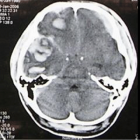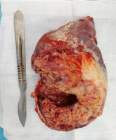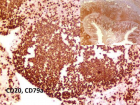Abstract
Case Report
Massive gastrointestinal bleeding; never too old to be due to Meckel’s Diverticulum - A case report and literature review
Subhi Mansour, Kenan Halloun and Safi Khuri*
Published: 03 June, 2019 | Volume 3 - Issue 1 | Pages: 034-039
Gastrointestinal (GI) bleeding is a very common medical problem encountered in the acute care setting, and is a major cause of admission to hospitals with about 300,000 patients admitted annually. Obscure GI bleeding, defined as persistent or recurrent bleeding following initial negative upper and lower endoscopy, represents approximately 5% of all GI hemorrhages. The small bowel is the most common source for obscure GI bleeding. Variable lesions of the small bowel can cause obscure GI bleeding, with tumors, Crohn’s disease and Meckel’s diverticulum being more common in young age group. Meckel’s diverticulum, the most common GI congenital malformation, is usually asymptomatic and incidentally found. It can present with GI bleeding, seen more in pediatric patients, and rarely in adult patients. Herein, we present a 45 years old female patient, presenting with massive obscure GI bleeding due to Meckel’s diveticulum.
Read Full Article HTML DOI: 10.29328/journal.ascr.1001030 Cite this Article Read Full Article PDF
References
- Hilsden RJ, Shaffer EA. Management of gastrointestinal hemorrhage. Can Fam Physician. 1936; 41: 1939-1941. Ref.: https://bit.ly/2KnrPBn
- Blatchford O, Davidson LA, Murray WR, Blatchford M, Pell J. Acute upper gastrointestinal haemorrhage in west of Scotland: case ascertainment study. BMJ. 1997; 315: 510-514. Ref.: https://bit.ly/2Xsa7A0
- British Society of Gastroenterology Endoscopy Committee. Non-variceal upper gastrointestinal haemorrhage: guidelines. Gut. 2002; 4: 1-6. Ref.: https://bit.ly/2HS2cqJ
- Bull-Henry K, Al-Kawas FH. Evaluation of occult gastrointestinal bleeding. Am Fam Physician. 2013; 87: 430-436. Ref.: https://bit.ly/2EOL1UR
- Raju GS, Gerson L, Das A, Lewis B. American Gastroenterological Association (AGA) Institute medical position statement on obscure gastrointestinal bleeding. Gastroenterology. 2007; 133: 1694-1696. Ref.: https://bit.ly/30Yvqvn
- Szold A, Katz LB, Lewis BS. Surgical approach to occult gastrointestinal bleeding. Am J Surg. 1992; 163: 90-92. Ref.: https://bit.ly/2Wht4sF
- Gunjan D, Sharma V, Rana SS, Bhasin DK. Small bowel bleeding: a comprehensive review. Gastroenterology Report. 2014; 2: 262-275. Ref.: https://bit.ly/2EOt0pA
- Zhang BL, Chen CX, Li YM. Capsule endoscopy examination. Identifies different leading causes of obscure gastrointestinal. Bleeding in patients of different ages. Turk J Gastroenterol. 2012; 23: 220-225. Ref.: https://bit.ly/2JR0fN7
- Levy AD, Hobbs CM. From the archives of the AFIP. Meckel diverticulum: radiologic features with pathologic correlation. Radiographics. 2004; 24: 565–587. Ref.: https://bit.ly/2XjTczA
- Sagar J, Kumar V, Shah DK. Meckel's diverticulum: a systematic review. J R Soc Med. 2006; 99: 501-505. Ref.: https://bit.ly/2WfAixF
- Dumper J, Mackenzie S, Mitchell P, Sutherland F, Quan ML, et al. Complications of Meckel's diverticula in adults. Can J Surg. 2006; 49: 353-357. Ref.: https://bit.ly/2MlRNHM
- Satya R, O'Malley JP. Meckel diverticulum with massive bleeding. Radiology. 2005; 236: 836-840. Ref.: https://bit.ly/2WyR9uB
- Ymaguchi M, Takeuchi S, Awazu S. Meckel's diverticulum. Investigation of 600 patients in Japanese literature. Am J Surg. 1978; 136: 247-249. https://bit.ly/2JSHN71
- Elsayes KM, Menias CO, Harvin HJ, Francis IR. Imaging manifestations of Meckel's diverticulum. AJR Am J Roentgenol. 2007; 189: 81–88. Ref.: https://bit.ly/2Wf0W9C
- Fink AM, Alexopoulou E, Carty H. Bleeding Meckel's diverticulum in infancy: unusual scintigraphic and ultrasound appearances. Pediatr Radiol. 1995; 25: 155-156 Ref.: https://bit.ly/310Y4vO
- Stǎnescu GL, Pleșea IE, Diaconn R, Gheonea C, Sabetay C, et al. Meckel’s diverticulum in children, clinical and pathological aspects. Rom J Morphol Embryol. 2014; 55 (supp 3): 1167-1170. Ref.: https://bit.ly/2IoGNV9
- Kusumoto H, Yoshida M, Takahashi I, Anai H, Maehara Y, et al. Complications and diagnosis of Meckel's diverticulum in 776 patients. Am J Surg. 1992; 164: 382-383. Ref.: https://bit.ly/2XjtThh
- Stone PA, Hofeldt MJ, Campbell JE, Vedula G, DeLuca JA, et al. Meckel diverticulum: ten-year experience in adults. South Med J. 2004; 97: 1038-1041. https://bit.ly/2Igztea
- Mitchell AW, Spencer J, Allison DJ, Jackson JE. Meckel's diverticulum: angiographic findings in 16 patients. AJR. 1998; 170: 1329-1333. Ref.: https://bit.ly/2WG7NIy
- Carlioz P. Le diverticule de Meckel. De l’embryologie à la chirurgie. Montpellier: Sauramps. 2007. Ref.: https://bit.ly/2QBZ84F
- Leijonmarck CE, Bonman-Sandelin K, Frisell J, Räf L. Meckel's diverticulum in the adult. Br J Surg. 1986; 73: 146-149. Ref.: https://bit.ly/2Icifyn
- Chan KW, Lee KH, Mou JW, Cheung ST, Tam YH. Laparoscopic management of complicated Meckel’s diverticulum in children: a 10-year review. Surg Endosc. 2008; 22: 1509–1512. Ref.: https://bit.ly/2YX4IBB
- Yamaguchi M, Takeuchi S, Awazu S. Meckel's diverticulum. Investigation of 600 patients in Japanese literature. Am J Surg. 1978; 136: 247–249. Ref.: https://bit.ly/2JSHN71
- Clark JK, Paz DA, Ghahremani GG. Imaging of Meckel’s diverticulum in adults: pictorial essay. Clin Imaging. 2014; 38: 557–564. Ref.: https://bit.ly/2Wzqz4j
- Lin S, Suhocki PV, Ludwig KA, Shetzline MA. Gastrointestinal bleeding in adult patients with Meckel's diverticulum: the role of technetium 99m pertechnetate scan. South Med J. 2002; 95: 1338–1341. Ref.: https://bit.ly/2HOnTaM
- Sfakianakis GN, Conway JJ. Detection of ectopic gastric mucosa in Meckel's diverticulum and in other aberrations by scintigraphy: ii. Indications and methods—a 10-year experience. J Nucl Med. 1981; 22: 732–738. Ref.: https://bit.ly/2IdVxFX
- Schwartz MJ, Lewis JH. Meckel's diverticulum: pitfalls in scintigraphic detection in the adult. Am J Gastroenterol. 1984; 79: 611–618. Ref.: https://bit.ly/2JPw3lG
- Lee JS, Moon W, Park SJ, Park MI, Kim KJ, et al. Haemoorhagic Meckel’s diverticulum in an older woman diagnosed by repeated angiographies. Turk J Gastroenterol. 2009; 20: 282-286. Ref.: https://bit.ly/2Xr1xBX
- Lichtstein DM, Herskowitz B. Massive gastrointestinal bleeding from Meckel's diverticulum in a 91-year-old man. South Med J. 1998; 91: 753-754. Ref.: https://bit.ly/30S0jS6
- Lequet J, Menahem B, Alves A, Fohlen A, Mulliri A. Meckel's diverticulum in the adult. J Visc Surg. 2017; 154: 253–259. Ref.: https://bit.ly/2HOh0q3
Figures:
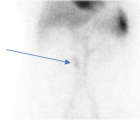
Figure 1

Figure 2
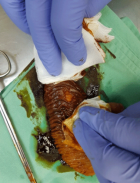
Figure 3
Similar Articles
-
Laparoscopic Adrenalectomy; A Short Summary with Review of LiteratureMushtaq Chalkoo*,Naseer Awan,Hilal Makhdoomi,Syed Shakeeb Arsalan ,Waseem Raja. Laparoscopic Adrenalectomy; A Short Summary with Review of Literature . . 2017 doi: 10.29328/journal.ascr.1001001; 1: 001-011
-
Bouveret Syndrome in an Elderly FemaleZvi H. Perry*, Udit Gibor,Shahar Atias,Solly Mizrahi,Alex Rosental, Boris Kirshtein. Bouveret Syndrome in an Elderly Female . . 2017 doi: 10.29328/journal.ascr.1001002; 1: 012-015
-
Intestinal obstruction complicated by large Morgagni herniaMartín Arnau B*,Medrano Caviedes R,Rofin Serra S, Caballero Mestres F,Trias Folch M. Intestinal obstruction complicated by large Morgagni hernia . . 2017 doi: 10.29328/journal.ascr.1001003; 1: 016-020
-
Clinical significance of Urinary Amylase in Acute PancreatitisMumtaz Din Wani,Mushtaq Chalkoo*,Zaheer Ahmed,Awhad Mueed Yousuf,Yassar Arafat,Syed Shakeeb Arsalan,Jaffar Hussain. Clinical significance of Urinary Amylase in Acute Pancreatitis . . 2017 doi: 10.29328/journal.ascr.1001004; 1: 021-031
-
Use of Orthodeoxia by pulse Oximetry in the detection of Hepatopulmonary SyndromeCesar Raul Aguilar Garcia*,Guadalupe Viridiana Ontiveros Guerra. Use of Orthodeoxia by pulse Oximetry in the detection of Hepatopulmonary Syndrome . . 2017 doi: 10.29328/journal.ascr.1001005; 1: 038-041
-
Surgery and new Pharmacological strategy in some atherosclerotic chronic and acute conditionsLuisetto M*,Nili-Ahmadabadi B,Ghulam Rasool Mashori. Surgery and new Pharmacological strategy in some atherosclerotic chronic and acute conditions . . 2017 doi: 10.29328/journal.ascr.1001006; 1: 042-048
-
The revolution of cardiac surgery evolution Running head: Cardiac surgery evolutionMarzia Cottini*. The revolution of cardiac surgery evolution Running head: Cardiac surgery evolution . . 2017 doi: 10.29328/journal.ascr.1001007; 1: 049-050
-
Dieulafoy’s Lesion related massive Intraoperative Gastrointestinal Bleeding during single Anastomosis Gastric Bypass necessitating total Gastrectomy: A Case ReportAshraf Imam,Khalayleh Harbi*,Miller Rafael, Khoury Deeb,Buyeviz Victor,Guy Pines,Sapojnikov Shimon. Dieulafoy’s Lesion related massive Intraoperative Gastrointestinal Bleeding during single Anastomosis Gastric Bypass necessitating total Gastrectomy: A Case Report . . 2017 doi: 10.29328/journal.ascr.1001008; 1: 051-055
-
Laparoscopic partial nephrectomy-does tumor profile influence the operative performance?Krishanu Das*, George P Abraham, Kishnamohan Ramaswai, Datson George P,Jisha J Abraham,Thomas Thachill, Oppukeril S Thampan. Laparoscopic partial nephrectomy-does tumor profile influence the operative performance? . . 2017 doi: 10.29328/journal.ascr.1001009; 1: 056-060
-
Comments for the Nuremberg Code 70 Years LaterJie Zhang,Chao-Jun Kong, Zhong Jia*. Comments for the Nuremberg Code 70 Years Later . . 2017 doi: 10.29328/journal.ascr.1001010; 1: 061-061
Recently Viewed
-
Clinical and Histopathological Mismatch: A Case Report of Acral FibromyxomaMonica Mishra*,Kailas Mulsange,Gunvanti Rathod,Deepthi Konda. Clinical and Histopathological Mismatch: A Case Report of Acral Fibromyxoma. Arch Pathol Clin Res. 2025: doi: 10.29328/journal.apcr.1001045; 9: 005-007
-
Unconventional powder method is a useful technique to determine the latent fingerprint impressionsHarshita Niranjan,Shweta Rai,Kapil Raikwar,Chanchal Kamle,Rakesh Mia*. Unconventional powder method is a useful technique to determine the latent fingerprint impressions. J Forensic Sci Res. 2022: doi: 10.29328/journal.jfsr.1001035; 6: 045-048
-
Doppler Evaluation of Renal Vessels in Pediatric Patients with Relapse and Remission in Different Categories of Nephrotic SyndromeAmit Nandan Dhar Dwivedi*, Srishti Sharma, OP Mishra, Girish Singh. Doppler Evaluation of Renal Vessels in Pediatric Patients with Relapse and Remission in Different Categories of Nephrotic Syndrome. J Clini Nephrol. 2023: doi: 10.29328/journal.jcn.1001112; 7: 067-072
-
Atlantoaxial subluxation in the pediatric patient: Case series and literature reviewCatherine A Mazzola*,Catherine Christie,Isabel A Snee,Hamail Iqbal. Atlantoaxial subluxation in the pediatric patient: Case series and literature review. J Neurosci Neurol Disord. 2020: doi: 10.29328/journal.jnnd.1001037; 4: 069-074
-
Intelligent Design of Ecological Furniture in Risk Areas based on Artificial SimulationTorres del Salto Rommy Adelfa*, Bryan Alfonso Colorado Pástor*. Intelligent Design of Ecological Furniture in Risk Areas based on Artificial Simulation. Arch Surg Clin Res. 2024: doi: 10.29328/journal.ascr.1001083; 8: 062-068
Most Viewed
-
Evaluation of Biostimulants Based on Recovered Protein Hydrolysates from Animal By-products as Plant Growth EnhancersH Pérez-Aguilar*, M Lacruz-Asaro, F Arán-Ais. Evaluation of Biostimulants Based on Recovered Protein Hydrolysates from Animal By-products as Plant Growth Enhancers. J Plant Sci Phytopathol. 2023 doi: 10.29328/journal.jpsp.1001104; 7: 042-047
-
Sinonasal Myxoma Extending into the Orbit in a 4-Year Old: A Case PresentationJulian A Purrinos*, Ramzi Younis. Sinonasal Myxoma Extending into the Orbit in a 4-Year Old: A Case Presentation. Arch Case Rep. 2024 doi: 10.29328/journal.acr.1001099; 8: 075-077
-
Feasibility study of magnetic sensing for detecting single-neuron action potentialsDenis Tonini,Kai Wu,Renata Saha,Jian-Ping Wang*. Feasibility study of magnetic sensing for detecting single-neuron action potentials. Ann Biomed Sci Eng. 2022 doi: 10.29328/journal.abse.1001018; 6: 019-029
-
Pediatric Dysgerminoma: Unveiling a Rare Ovarian TumorFaten Limaiem*, Khalil Saffar, Ahmed Halouani. Pediatric Dysgerminoma: Unveiling a Rare Ovarian Tumor. Arch Case Rep. 2024 doi: 10.29328/journal.acr.1001087; 8: 010-013
-
Physical activity can change the physiological and psychological circumstances during COVID-19 pandemic: A narrative reviewKhashayar Maroufi*. Physical activity can change the physiological and psychological circumstances during COVID-19 pandemic: A narrative review. J Sports Med Ther. 2021 doi: 10.29328/journal.jsmt.1001051; 6: 001-007

HSPI: We're glad you're here. Please click "create a new Query" if you are a new visitor to our website and need further information from us.
If you are already a member of our network and need to keep track of any developments regarding a question you have already submitted, click "take me to my Query."






